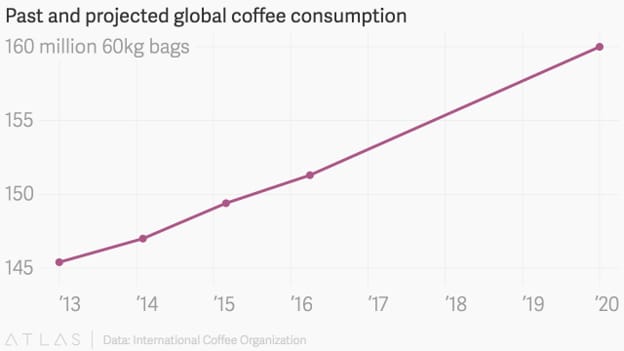South Korea is banning coffee in all of its schools

Coffee was previously exempt from laws surrounding caffeine consumption in schools. Image: REUTERS/Osman Orsal
The sale of coffee is to be banned in South Korean schools following a decision by the Ministry of Food and Drug Safety, according to a report in the Korea Times.
Cups of coffee are currently sold from vending machines and snack shops in schools. But the Ministry is concerned about the impact on children’s health. It cites fears about the long term impact on physical and mental health, as well as short-term dizziness, a rapid heartbeat and trouble sleeping.
Currently, products high in caffeine or calories or low in nutritional value are restricted or banned from sale in schools. Coffee had been classified as an adult beverage, and so not included in the ban. However, a revision to an act controlling children’s diets has changed this.
"The revision aims to create healthy eating habits among children and teenagers," a ministry official is quoted as saying in the paper. "We will make sure coffee is banned at schools without fail."
It’s not just the pupils that won’t be able to get their caffeine kick though - teachers are included as well.

The coffee shop explosion
Coffee is an increasingly popular drink in South Korea, with more than 18,000 specialist coffee shops in the capital Seoul alone. This is up from around 10,000 at the beginning of the decade.
Data suggests the market grew significantly over this time to more than 11 trillion won ($9.9bn). Per capita consumption is also on the rise - doubling since 1990 to 2.3kg by 2014. By comparison, the US consumed around 4.5kg per capita in 2014.
No one is quite sure how we discovered coffee - but we certainly can’t get enough of the stuff.

Across the world, More than 7 million tonnes of coffee were consumed in 2016, according to EuroMonitor International. Brazil is now thought to be the biggest consumer of coffee, followed by the USA and Indonesia.
Although there are concerns about the side-effects of consuming excessive caffeine, other studies point to the health benefits of drinking several cups a day.
The ban in South Korean schools is set to come into force on 14 September.
Don't miss any update on this topic
Create a free account and access your personalized content collection with our latest publications and analyses.
License and Republishing
World Economic Forum articles may be republished in accordance with the Creative Commons Attribution-NonCommercial-NoDerivatives 4.0 International Public License, and in accordance with our Terms of Use.
The views expressed in this article are those of the author alone and not the World Economic Forum.
Stay up to date:
Republic of Korea
Related topics:
Forum Stories newsletter
Bringing you weekly curated insights and analysis on the global issues that matter.







